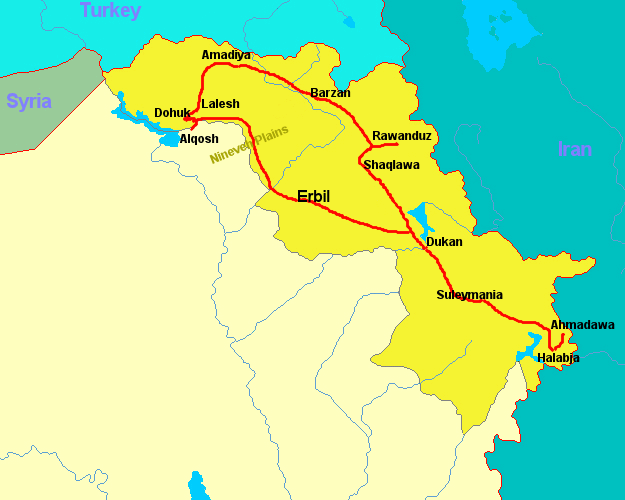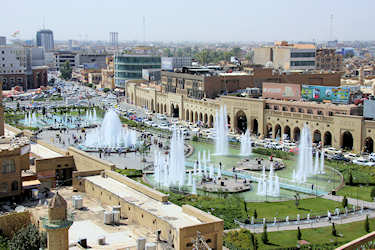Iraqi Kurdistan

Historie
At the end of World War I, the Treaty of Sèvres (10 August 1920) was the peace treaty between the Ottoman
Empire and Allies and includes an autonomous homeland for the Kurds. It was rejected before it had been ratified, by
the Turkish national movement who fought against the terms of the treaty and the occupation of Anatolia. The Treaty
of Lausanne (24 July 1923) ended the conflict and defined the borders of modern Western Asia and the modern
Republic of Turkey.
By 1927, the Barzani clan had become vocal supporters of Kurdish rights in Iraq. In 1929, the Barzani demanded
the formation of a Kurdish province in northern Iraq. Emboldened by these demands, in 1931 Kurdish notables petitioned
the League of Nations to set up an independent Kurdish government. Under pressure from the Iraqi government and the
British, the most influential leader of the clan, Mustafa Barzani was forced into exile in Iran in 1945.
After the military coup by Abdul Karim Qasim in 1958, Mustafa Barzani was invited by Qasim to return
from exile, where he was greeted with a hero's welcome. As part of the deal arranged between Qasim and Barzani, Qasim
had promised to give the Kurds regional autonomy in return for Barzani's support for his policies. By early 1960, it
became apparent that Qasim would not follow through with his promise of regional autonomy. By February 1961, Barzani
had successfully defeated the pro-government forces and consolidated his position as leader of the Kurds. This was
not received well in Baghdad, and as a result, a military offensive against the north was started to return government
control of the region. A peace plan was announced in March 1970 and provided for broader Kurdish autonomy.
The Kurdish Rebellion of 1983 occurred during the Iran-Iraq war as Kurds of northern Iraq rebelled against Saddam
Hussein, in an attempt to form their own autonomous country. The most violent stage of this rebellion was the Anfal
campaign of the Iraqi Army against the Kurdish minority, which took place between 1986–1989.
The Anfal campaign, was lead by Ali Hassan al-Majid (a cousin of the Iraqi leader Saddam Hussein), who earned the
nickname of "Chemical Ali". It included the use of ground offensives, aerial bombing, systematic destruction
of settlements, mass deportation, firing squads, and chemical warfare, and included the Halabja poison gas attack. The
rebellion ended in 1988 with an agreement of amnesty between the two belligerents, Iraqi government and Kurdish rebels.
In 1991 (after the Persian Gulf War), Iraq's Kurds rise up against Saddam Hussein, encouraged by the United States.
Iraq quashes the rebellions, killing thousands. The U.N. coalition forces do not come to the aid of the Kurds, but
eventually establish a no-fly zone in the north for their protection. From this point, Iraqi Kurdistan has
achieved de facto independence to be ruled by the two principal Kurdish parties – the Kurdish Democratic
Party and the Patriotic Union of Kurdistan – free from the control of Baghdad. The
region then adopted its own flag and national anthem.
Since the Iraqi government had withdrawn its forces from Kurdistan in October 1991, Baghdad had imposed an economic
blockade over the region, reducing its oil and food supplies. The Kurdish economy also suffered heavily because a
United Nations embargo on Iraq was still in place, preventing trade between Kurdistan and other nations. The severe
economic hardships caused by the embargoes, fuelled tensions between the two dominant political parties; the KDP the
PUK over control of trade routes and resources This led to an intra-Kurdish conflict and warfare between 1994 and 1998.
Kurdish parties joined forces against the Iraqi government during the war in spring 2003. Following the removal of
Saddam Hussein's administration and the subsequent violence, the Kurdish region was the only in Iraq to be ranked
"secure" by the US military. The relative security and stability of the region has allowed the Kurdistan
Regional Government to sign a number of investment contracts with foreign companies.
I visited Iraqi Kurdistan in september 2012.
On that trip i have seen
Erbil
Alqosh
Dohuk
Lalesh
Amadiya
Barzan
Rawanduz
Shaqlawa
Dukan
Suleymania
Halabja
Ahmadawa
Please let me know when you're having questions.
i would be pleased to help you.
Things to do and other tips
